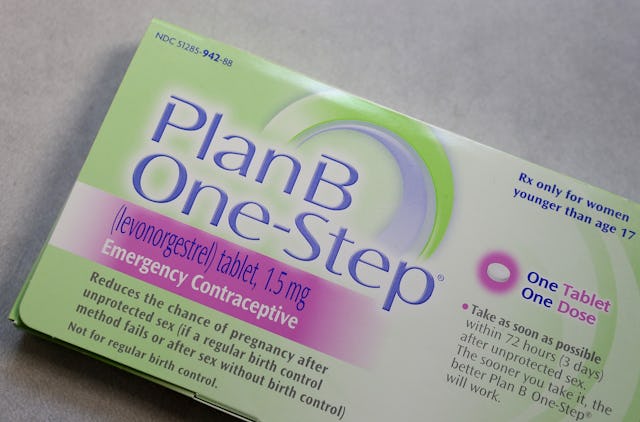Pharmacies Are Limiting How Much Plan B You Can Buy
CVS, Walmart, and Rite Aid are limiting the purchase of contraceptive pills in the wake of the Supreme Court’s decision to overturn Roe v. Wade.

National drugstore chains like Rite Aid and CVS are limiting how much emergency contraception people can buy, due to an increased demand in the wake of Roe v. Wade’s removal.
"Due to increased demand, at this time we are limiting purchases of Plan B contraceptive pills to three per customer," Alicja Wojczyk, senior manager of external communications for Rite Aid, told CNN.
CVS is following similar steps. Matt Blanchette, senior manager of retail communications at CVS Pharmacy, told CNN that even though the retailer has “ample supply” of both Plan B and Aftera — two forms of emergency contraception — stores will still be limiting customers to a limit of three “to ensure equitable access and consistent supply on store shelves."
Walgreens’ website lists Plan B and Aftera as out of stock for shipping but available for pickup in certain locations. “We are working to restock online inventory from ship-to-home,” a spokesperson told Washington Post.
Walmart is limiting emergency contraceptive purchases to 4-6 per customer, according to Wall Street Journal. Walmart’s website had some pills available without limits, but those would not ship until next month. Right now, it is unclear whether or not Walmart will continue to limit its supply after this week.
The rationing makes sense, given the upheaval and warranted panic caused by the Supreme Court’s removal of Roe v. Wade on Friday — not to mention the ever-growing supply chain crisis that has affected everything from baby formula to school lunches.
The decision overturned the constitutional right to abortion established in 1973, leaving the decision of abortion and reproductive policy in the hands of the state. Many states have already severely restricted or outright banned abortion, and 13 states had trigger laws that went into immediate effect following the Supreme Court’s decision.
Following the SCOTUS decision, Attorney General Merrick Garland urged the FDA to sue any states trying to ban mifepristone, which is used to medically induce an abortion.
“This decision deals a devastating blow to reproductive freedom in the United States. It will have an immediate and irreversible impact on the lives of people across the country. The Justice Department will use every tool at our disposal to protect reproductive freedom,” Garland said. “And we will not waver from this Department’s founding responsibility to protect the civil rights of all Americans.”
Reproductive justice advocates believe that access to Plan B and the abortion pill will be the next talking point for conservative states that already have restrictive abortion laws.
And while it might be tempting to stock up on contraceptives, “just in case,” many are also reminding folks of the toilet paper and hand sanitizer shortages at the beginning of the pandemic; do not panic stockpile if you do not need to, as it could limit access to folks who are unable to buy in bulk.
If you have the urge to buy massive amounts of Plan B but do not need it yourself or have enough, consider purchasing and donating to local abortion and reproductive justice organizations.
A few notes if you are buying Plan B for future use: the morning-after pill expires four years after its production. Store it in a dark place at room temperate — light and heat can affect it. Having Plan B on hand to use in an emergency is a good idea since it is more effective the sooner you take it after sex.